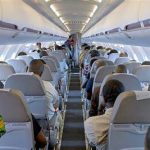
The key factor in any country’s air travel service is how safe it is to fly, which becomes poignant when commercial air travel is involved.
This is why the United Nations established the International Civil Aviation Organisation (ICAO) to regulate air travel in the world for member states.
ICAO in turn moved for the establishment of Civil Aviation Authority by members states in order to effectively regulate air travel in every country and make sure that it is safe. That was how the Nigeria Civil Aviation Authority was born.
Looking at air travel in Nigeria since NCAA become effective on January 1, 2000, it has undulating history because there have been a lot of air crashes, which thinned down over time and today Nigeria can boast of not recording accidents involving commercial airline since after 2013.
Nigeria has also recorded many Director Generals who manned the affairs of NCAA and some of them were outstanding while others occupied the footnote of history.
But in the last one year, a lot has happened at NCAA under the management of Captain Chris Najomo, the acting Director General, from addressing passenger complaints, to initiating sanctions on defaulting airlines to certification of Nigerian airports and tackling illegal charter operations in Nigeria.
There were some critical actions taken by Captain Najomo to further strengthen flight safety and also sanitize the aviation industry.
Under Najomo’s watch, the NCAA inaugurated its Flight Data Analysis Centre (FDAC) on December 11, 2024. Minister Keyamo officially commissioned this state-of-the-art facility, praising it as a game-changer in aviation oversight. Describing the centre as pivotal, Keyamo emphasized its role in creating a robust safety data bank and enhancing compliance with international standards.
The FDAC’s advanced capabilities include analyzing flight data recorders (FDRs) and cockpit voice recorders (CVRs) to detect anomalies and prevent safety incidents. This proactive, data-driven approach enables the NCAA to address safety concerns effectively, aligning Nigeria’s aviation operations with International Civil Aviation Organization (ICAO) standards.
The NCAA has also made significant strides in digitising its operations. Najomo announced the launch of a new portal that will facilitate the digital processing of approvals, licenses, recertifications, and passenger complaints.
Najomo said the system would enhance the efficiency of the NCAA, allowing for quicker processing and real-time monitoring of airline performance. The portal will also enable the public to view airline service evaluations, offering insights into the best and worst performers.
There were series of major incidents which made Najomo to scrutinize the financials of Nigerians carriers because there is correlation between dearth of funds in an airline and its proclivity to accident. When Dana Air flight overshot the runway, followed by similar incident subsequently, NCAA suspended the airline.
NCAA later directed that the airline should do away with its MD 82/83 aircraft, which were permanently grounded, leaving it only two Boeing 737 aircraft.
The regulatory authority said it was also not pleased with the airline’s financials, which according to it, could not buoy it to safe operations.
Following the inability of the airline to meet all safety regulations and other conditions given it by NCAA, the airline, in May last year, disengaged its workers. Industry pundits are of the view that it was a critical decision taken by the regulatory body under Najomo and further investigation also revealed that the decision to ground the airline followed regulatory process and foreclosed possible safety infraction that could be lethal.
During the last International Civil Aviation Organisation (ICAO) Universal Safety Audit Program Continuous Monitoring Approach (USOAP), in September 2023, Nigerian airports were not certified because of too many gaps but within that time and late last year, the gaps were closed leading to the citification of Lagos and Abuja airports.
Najomo recalled during the ceremony to hand over the audit certificates to the Federal Airports Authority of Nigeria (FAAN); that in March 2001, the International Civil Aviation Organization (ICAO) Council adopted a new Standard that required certification of aerodromes used for international operations.
This standard, Najomo said, became applicable 27“ November of 2003, adding that Nigeria initially complied with this provision by certifying two international airports in 2017.
He explained that the three-year duration of those certificates lapsed in November 2020 in line with the Nigeria Civil Aviation Regulations in force then.
“At the expiration of NAIA (Abuja)and MMIA Lagos) aerodrome certificates, a sixmonth extension was granted to FAAN to operate the aerodromes due to the COVID-19 Pandemic which we all remember had devastating effects on the aviation sector.
“However, the extension was granted on the condition that FAAN resolve all outstanding certification CAP items and complete the recertification process within the extension period. To be detailed, there were 136 items for MMIA and 29 items for NAIA, so this was no mean feat.Since then, NCAA and FAAN got down to the hard work of ensuring closure of the critical certification findings as required by the Regulations,” Najomo explained.
The Managing Director of FAAN, Mrs. Olubunmi Kuku, on Wednesday said in Lagos that FAAN and NCAA are working to certify the other international airports in Port Harcourt Kano and Enugu, commending NCAA for its support to see that the airports meet international standards.
in late 2023 there were series of incidents where private jets were overshooting the runway on landing and this dragged on into 2024, prompting NCAA to take decisive action. It decided to scrutinize the business aviation sub-sector.
After studying the incidents, NCAA enforced stricter regulations while allowing the flexibility but ensured that charter operators complied with the rules. 10 airlines were sanctioned for using Permits for Non-Commercial Flights (PNCF) for unauthorized charter operations. This crackdown stopped the misuse of private jets by high-net-worth individuals for commercial purposes without abiding by the rules. Operating commercial charter requires stricter regulatory oversight.
The NCAA suspended permits for offending operators and initiated a review of all PNCF holders to ensure adherence to licensing terms. This action reinforced the Authority’s commitment to fair competition, safety, and operational integrity in the sector.
in line with the major objective of the Tinubu administration to empower domestic airlines and enable them lease aircraft on long term and also access international credit facility, Najomo worked with the Minister of Aviation and Aerospace Development, Festus Keyamo, to create a favourable environment for aircraft financing.
This prompted Najomo to update NCAA’s IDERA (Irrevocable De-registration and Export Request Authorization) procedures. These updates were in line with the Cape Town Convention to ensure transparent deregistration processes in dispute cases, boosting Nigeria’s credibility among global financiers.
On Wednesday last week a flight from Uyo to Abuja operated by Ibom Air was disrupted by an unruly passenger, who insisted she must travel with her luggage when the airline stated otherwise in order to maintain balance for safety in the aircraft.
It is some of these incidents that made Nojomo to promise that in this new year, 2025, he would work with his staff to device means to end the phenomenon of unruly passengers at the airports, noting that they have caused harm to flight operations and it is dangerous to continue to allow them do so and observed that such incidents happen majorly with domestic flight service.
“We will find a solution to the issue of unruly passengers. That matter will be tackled soon because it is getting too much, but airlines should also know their obligations to the passengers,” Najomo said.

Earlier, NCAA had levelled some sanctions against airlines for infractions against consumer protection regulations and these include non-payment of refunds within the stipulated time frame, non-responsiveness to the NCAA’s directives, missing luggage, manhandled luggage, short-landed baggage, and delayed and cancelled flights, amongst others.
He stated that while airlines are not always to blame for flight disruptions, NCAA regulations require them to take specific actions during such incidents. Non-compliance results in various sanctions.
Najomo in managing NCAA, is guided by nine-point agenda, tagged NCAA Project 2024. These include staff welfare, training and reorientation, ICAO audit, simplified certification and licensing processes, ISO 9001 Certification, intensified revenue drive, enhanced surveillance, intensified consumer protection, ICT digital transformation and change management and so far, he has brought some positive changes to the agency, including significantly improving the workers’ welfare.






